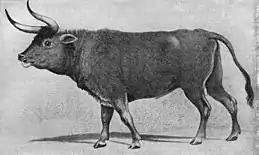bour
See also: Bour
Middle English
Alternative forms
Etymology
From Old English būr, from Proto-West Germanic *būr, from Proto-Germanic *būraz, from Proto-Indo-European *bʰuH-.
Pronunciation
- IPA(key): /buːr/
Noun
bour (plural boures)
- A residence, house, or dwelling.
- A bedroom or chamber (especially of a woman).
- 1387–1400, [Geoffrey] Chaucer, “The Nonnes Preestes Tale of the Cok / and Hen / Chaũtecler ⁊ Ꝑtelote”, in The Tales of Caunt́bury (Hengwrt Chaucer; Peniarth Manuscript 392D), Aberystwyth, Ceredigion: National Library of Wales, published c. 1400–1410], →OCLC, folio 99, verso:
- fful sooty was hire bour / and eek hire halle / In which she eet / ful many a sklendre meel
- Her room was really sooty, and so was her hall; / there she ate plenty of lean meals
- (figuratively) Something's resting place.
- (rare) A pen or stall for an animal.
Related terms
References
- “bǒur, n.”, in MED Online, Ann Arbor, Mich.: University of Michigan, 2007.
Romanian

bour
Etymology
Inherited from Latin būbalus, from Ancient Greek βούβαλος (boúbalos, “antelope, wild ox”). It may have passed through a Vulgar Latin intermediate form or was influenced by bubulus; cf. the form bobulum. Compare also Albanian buall. Doublet of bivol, which came through a Slavic source.
Noun
bour m (plural bouri)
- aurochs (Bos primigenius)
- wild bull
- wisent (Bison bonasus)
- the old emblem of Moldova (with the head of a wisent)
Declension
Synonyms
- (wisent): zimbru
See also
This article is issued from Wiktionary. The text is licensed under Creative Commons - Attribution - Sharealike. Additional terms may apply for the media files.